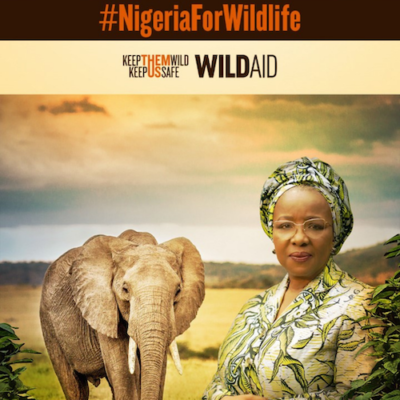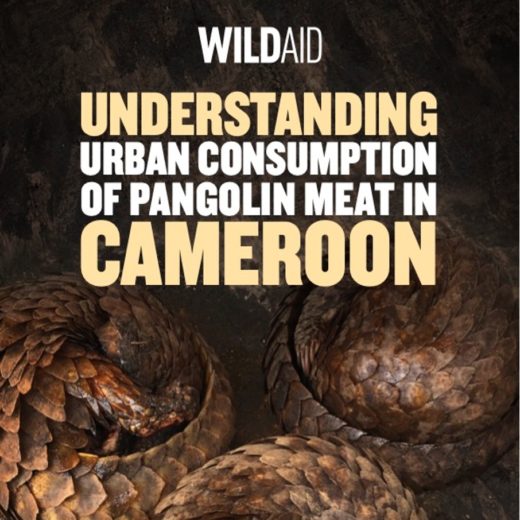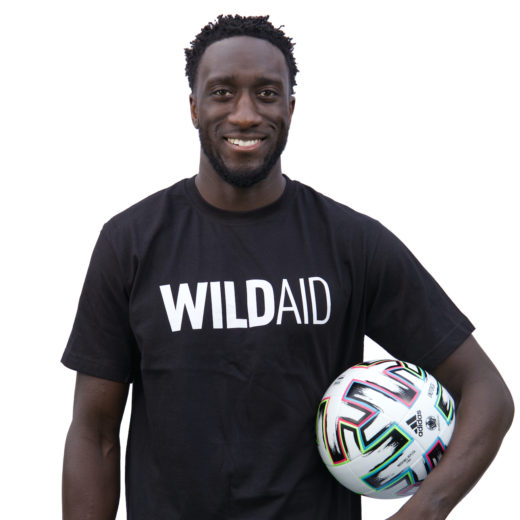
Influential voices hope to inspire Nigerians to end illegal bushmeat and ivory trade
Lagos, Nigeria – January 6, 2022, WildAid has launched a massive public awareness conservation campaign in Nigeria to reduce demand for illegal bushmeat in major urban centers, support enforcement activities to tackle the illegal wildlife trade and raise awareness of disappearing wildlife using the slogans “Keep them wild, keep us safe” and “Poaching steals from us all.”
The campaign includes TV public service announcements (PSAs), billboards, social media campaigns, radio and TV series with ambassadors from music, Nollywood, sports, religion, and entertainment. Developed in partnership with the Ministry of Environment and other government agencies, the campaign stars Afrobeats artists Davido and Mayorkun, Everton FC and Nigeria footballer Alex Iwobi, Nollywood star Stephanie Linus, comedians Emanuella and Josh2Funny, Mercy Jessica Odjugo (Miss Tourism Nigeria) and religious leaders from the Nigeria Inter-Religious Council (NIREC). International stars, including Lupita Nyong’o, Danai Gurira, Djimon Hounsou, Jackie Chan and Kung Fu Panda will also be featured in the campaign.
There are also messages from public figures such as Sharon Ikeazor, Nigeria’s former Federal Minister of State for Environment, Prof. Akin Abayomi, the Honourable Commissioner for Health of Lagos State and Ben Murray-Bruce, businessman and former Senator of the Federal Republic of Nigeria (2015-2019).
WildAid has built robust media partnerships with over two dozen broadcast, print and online organizations to amplify the campaign messages.
WildAid President, Peter Knights OBE, in Lagos for the launch stated, “With its dynamism and cultural influence, Nigeria can turn things around for wildlife and become a regional leader in wildlife protection, which can boost the economy through tourism and safeguard the Nigerian public from zoonotic disease.”
Today, Nigeria has no surviving cheetahs, rhinos or giraffes, and fewer than 50 lions, 100 gorillas, 500 elephants and 2,300 chimpanzees left in the wild. Despite ongoing conservation efforts, poaching for body parts and meat along with habitat loss from deforestation, infrastructure development, and agricultural expansion threaten wildlife in Nigeria.
Illegal bushmeat consumption is widespread across Nigeria’s top cities. Commissioned by WildAid, a survey by GlobeScan revealed 71% of the respondents say they have consumed bushmeat at some point in their lives.
Nigeria has emerged as the top transit point in the world for illegal ivory and pangolin scales trafficked from Africa to Asia. Between 2016 – 2019, over half of the pangolin scales seized globally came from Nigeria.
The former Honourable Minister of State for Environment, Barr. Sharon Ikeazor said, “The Federal Government of Nigeria is committed to protecting, restoring, and promoting sustainable use of our biodiversity. We will support the sustainable management of forests, combat desertification, land degradation, and halt biodiversity loss. Our collaboration with relevant Agencies and Stakeholders to stem the tide of wildlife overexploitation and trafficking has led to the development and implementation of strategies to combat corruption risk associated with transnational organized wildlife crime.”
Consumption of bushmeat has been linked to zoonotic diseases, such as HIV-AIDS, Ebola, SARS, Lassa fever, monkeypox and COVID-19.
Lagos State Honourable Commissioner for Health, Prof. Akin Abayomi declared, “We have not been very good custodians of our ecosystems. We plunder, poison, extract and deplete our biodiversity not realizing that without the free gifts of nature that these biomes provide, we will cease to exist.
“Disrupting the delicate balances of nature with our heavy human footprint causes major repercussions such as severe weather changes and biological threats like COVID and Ebola. If we continue this path without a major and drastic reversal, we are inducing an existential threat scenario, meaning the earth may become too hostile for humans or other life forms to exist.”
As part of the campaign, WildAid is committed to helping Nigeria strengthen enforcement of its wildlife laws and has formed partnerships with government agencies involved in enforcing both local and international wildlife regulations to create a unified approach to tackling the bushmeat problem.
Kolawole Adekola, Director of Forestry Department, Federal Ministry of Environment said, “An aggressive, high-scale and continuous publicity campaign is imperative to raise awareness of the precarious trends in wildlife exploitation and trafficking. A participatory approach towards achieving sustainable management and utilisation of the forest ecosystem resources also needs to be promoted. The Federal Government through the Ministry of Environment is committed and collaborating with WildAid to achieve this.”
WildAid is currently working with the Lagos state government to update its wildlife protection laws along with Nigeria Customs Service and the National Environmental Standards and Regulations Enforcement Agency (NESREA) to support efforts to tackle the illegal wildlife trade and prevent the use of Nigerian ports and airports as transit hubs for wildlife trafficking.
WildAid is also working with Amo Farm Sieberer Hatchery, a chicken hatchery and distributor, to promote village-raised hybrid chicken as an alternative to illegal bushmeat for suppliers and consumers in Nigeria and across Africa. The village-raised chickens known as “Noilers” will be promoted in the media and to policymakers as a source of rural income and protein, as well as an alternative to illegal bushmeat.
Previous WildAid campaigns have contributed to an 80% reduction of shark fin imports to China, 75%+ reductions in the price of ivory and rhino horn in Asia, reductions in ivory poaching in Tanzania and increases in penalties for wildlife crime in Uganda.
Stay in touch and get the latest WildAid updates.
SIGN UPAbout WildAid
WildAid is a non-profit organization with a mission to protect wildlife from illegal trade and other imminent threats. While most wildlife conservation groups focus on protecting animals from poaching, WildAid primarily works to reduce global consumption of wildlife products such as elephant ivory, rhino horn and shark fin soup. With an unrivaled portfolio of celebrity ambassadors and a global network of media partners, WildAid leverages more than $308 million in annual pro-bono media support with a simple message: When the Buying Stops, the Killing Can Too.
Journalists on deadline may email communications@wildaid.org


